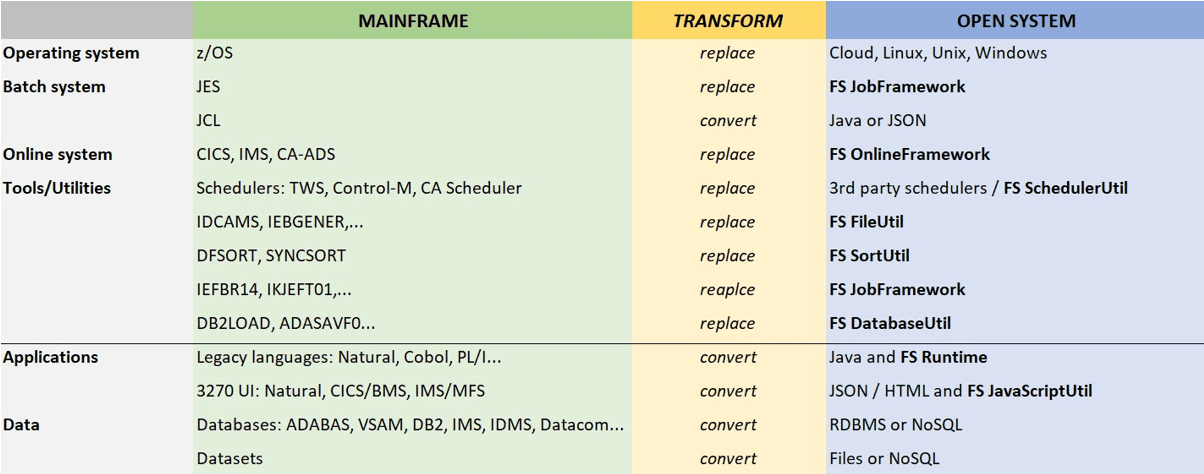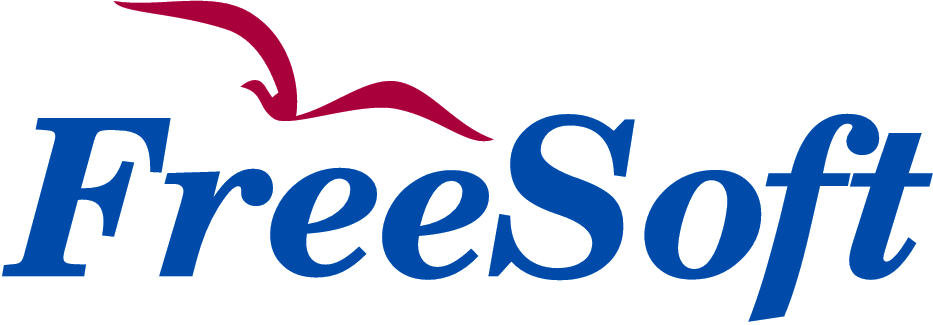Reduce Mainframe Costs
FreeSoft’s migration technology and methodology allow enterprises operating mainframe applications to move their mission critical online and batch workloads from mainframe infrastructure to open system environments without heavily disrupting the core business processes and functionality of the existing systems. Straightforward conversion concepts and seamless integration components enable incremental or big-bang migration and transition plans. Reduce operating cost by moving away systems and workloads from MIPS/MSU based fees to the cloud’s ‘pay as you go’ or similar open system based pricing models.
Mainframe Migration Platform
In addition to converting databases and applications FreeSoft’s LiberatorWorkbenchTM supports the complete migration of the complex runtime environment on the mainframe that interfaces with the application and databases in operations. Our framework enables fully automated migration of infrastructure elements and operations processes to the open world to seamlessly run the migrated applications covering scheduling and batch control, file management, SORTing and any other utilities that operates your workloads today.

Modernize All Operational Components
FreeSoft’s Mainframe migration platform applies a holistic approach in order to create functional systems in open system infrastructure through entirely automated processes with short delivery cycles. That means Replace or Convert all application and system components used in operations on the AS-IS system today, either bespoke software program sources – Natural, COBOL, PL/I, ObjectStar – or system software and service on mainframe infrastructure like batch submission and control, dataset management, online processing, etc. We support your mainframe migration project concept according to pre-defined time, budget and transition preferences with our API/RI oriented implementation approach.
API/RI Oriented Approach
We convert any source code e.g. COBOL, Natural, PL/I program sources or JCL in a standard manner to pure Java, using APIs that enables you to modernize your system at your own pace and according to your own programming standards. Post conversion you only need a standard CI/CD infrastructure to prepare your deployments. Based on your preference you are free to create implementations behind the APIs like batch executor/controller, dataset or file manager, SORT or any other utilities that are currently used by your batch workloads or online transactional applications. Alternatively you may request and use our RI – Reference Implementation – of those system components and utilities to shorten your project timelines and simplify testing and go-to—production processes.
More Than ‘Lift & Shift’
We migrate you as much towards real native open technologies as possible without heavily impacting or considerably altering your critical business processing. Our transformation method is more than a ‘lift-and-shift’ since it is not an emulation, more than a simple interpretation: it is migration to native open system technology, but still with minimized impact that still retains the ‘as-is’ business flow and embedded logic. Based on your preference we provide platform components for your seamless workload migration including z/OS dataset management system, GDG, SORT, EBCDIC encodings, hierarchical/network databases, relational database, legacy data types, and data access methods and so on.
Complete Conversion Framework for Systems Migrations
The LiberatorWorkbenchTM framework takes care of the technical migration steps:
KnowlegeLiberatorTM discovers and analyses all aspects of a legacy system by collecting data and metadata and prepares the DataLiberator for database migration and the CodeLiberator for application conversion.
DataLiberatorTM migrates the database schema and the content to the target database, may it be SQL or NoSQL database like migrating Mainframe ADABAS databases to Oracle.
CodeLiberatorTM converts source code between languages, like COBOL to Java, Natural to Java or PL/I to Java. Also, CodeLiberator creates – with the assistance of the KnowledgeLiberator and the DataLiberator – a persistence layer (DAO) to provide transparent database access.




 Eng
Eng 
 日本語
日本語 Br
Br De
De